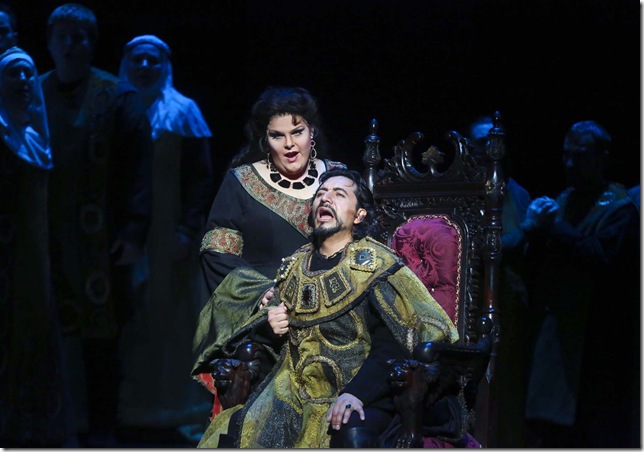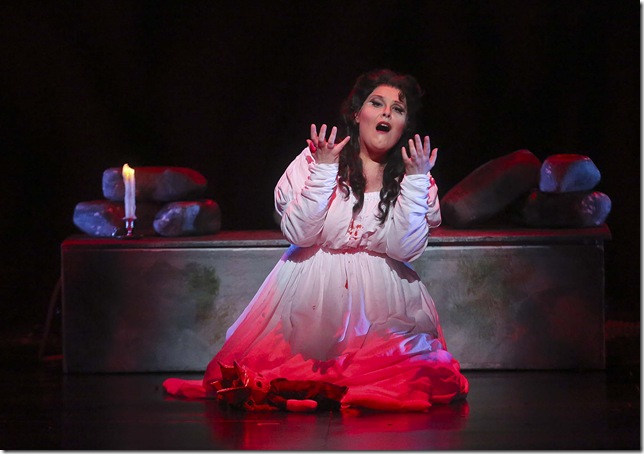Palm Beach Opera’s production of Verdi’s Macbeth, based on Shakespeare’s drama of the same name, won thunderous applause Saturday night. Hardly uplifting, with so many murders and blood everywhere, it is the music that carries it along and raises it to exultant levels of high art.
Shakespeare’s view of Macbeth has little historical basis in fact. Verdi was 33 when he wrote the opera, coming off a six-month convalescence after a breakdown. It was the most inventive and idealistic opera he’d written. Writing to his librettist, Francesco Maria Piave, he asked for extravagance, originality, sublimity and brevity, all of which the writer gave him, especially brevity.
How appropriate that Palm Beach Opera chose to stage this opera in the year Scotland will have a referendum to split from the United Kingdom, a joint venture started in 1603, when King James VI of Scotland became King James I of England because his cousin, Elizabeth I, had no recognized English heir to succeed her. As the drama of Macbeth unfolds about a greedy power grab, so today a few Scots politicians want their pockets lined with North Sea oil money before it runs out.
The 11th-century Macbeth of this opera was sung by Mexican baritone Luis Ledesma. At first bold in his ambition to kill King Duncan, backed by the witches’ prediction, he murders Duncan and seizes Scotland’s crown. Ledesma portrays a crumbling, conscience-stricken weakling admirably as the opera progresses and double meaning curses do him in. His lovely smooth baritone at times reminded me of the late Norman Treagle, with a similar flexibility up and down the register.
Singing Lady Macbeth, New Jersey soprano Jennifer Check rocked the house with her ringing top notes all perfectly sustained and often, as the score demands. Check was magnificent as the “power behind the man” who seeks the throne. Recognizing Macbeth might not be ruthless enough to attain his ambition, the librettist Piave has her sing, “Misdeeds line the road to power,” a concise summation of her cunning and what Verdi wanted from his wordsmith.
In her bloody handwringing mad scene, she brought down the house, with many cries of “Brava.” Having complete mastery of the role, Check gave a great and memorable performance.
Bass Richard Wiegold from Wales sang Banquo, a co-equal general to Macbeth in King Duncan’s army. Wiegold was cleverly understated both as a witness to Macbeth’s ambition and later as the ghost that haunts him at a banquet. He has a lovely, rolling chocolate-rich vocal timbre that resonates well and a musicality that Verdi would have appreciated.
The welcome surprise of the evening was the excellent performance of Michigan tenor Sean Panikkar, with roots in Sri Lanka, who sang the role of Macduff, a Scottish nobleman whose wife and children were victims of Macbeth’s bloody rule. He has an incredibly strong tenor sound, almost like a Heldentenor at times, with a warm production that is very pleasing on the ear. He gave a convincing anguished interpretation of an angry man about to take on Macbeth’s army and get revenge; his appearance marked a refreshing discovery of a fine young tenor with enormous promise.
Six very good seasoned Young Artists from Palm Beach Opera’s 2014 intake all sang well and acted their parts with aplomb. Joseph Dennis as Malcolm, son of King Duncan, who after Macbeth is killed becomes King; Rachel Arky, as the lady-in-waiting; Peter Tomaszewski, the doctor; Tobias Greenhalgh, a warrior; Bridgette Gan, the bloody child; and Claire Kuttler, the crowned child. All have futures in opera depending on their degree of intestinal fortitude. Ardean Landhuis, Neil Nelson and Daniel Caplin played a Murderer, Servant and Herald respectively.
Along the years we’ve become accustomed to hearing Greg Ritchey’s chorus sing well. This night they were superb. They have a lot of singing to do and I would put them up against the Met “wobblers’’ any time as being streaks ahead artistically and more importantly, vocally.
This fine music making was held together by David Stern, the conductor, a native New Yorker, who led with vigor and got the best out of the 71-piece symphony orchestra in the pit. The scenery, built by the Florentine Opera Company Scene Shop was spare but effective.
Central to the action was a 30-degree angled platform stage, circular in shape, with steps either side. Missing was the Stone of Scone in the king’s throne, a holy relic block of sandstone upon which kings of Scotland were seated to be crowned
Ron Vodicka’s lighting design was splendid. Huge natural-looking lightning strikes, clever freeze-frame spots for dueling fights of opposing armies, and a ghoulish green spot on the ghost of Banquo that gave me shivers. The dark scenes, where the witches brew their trouble,were all a bit too black (audiences like to see faces.) Costumes by Malabar avoided the obvious: Kilts for the men, which came later.
Bernard Uzan, the doyen director who has staged 375 American Opera Companies productions, deftly handled this story. Nice that two daggers appeared from the fly space just as Macbeth intones, “Is this a dagger that I see before me?’’ Otherwise, Uzan moved the crowds around with alacrity, and delivered a memorable banquet scene.
Palm Beach Opera’s next production is Rossini’s The Barber of Seville, on Feb. 21 and 22, at 7:30 p.m. (also on the 22nd, a children’s performance at 1 p.m.), and at 2 p.m. Feb 23, all Dreyfoos Hall in the Kravis Center. Call 833-7888 for tickets or more information.

